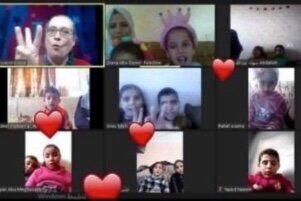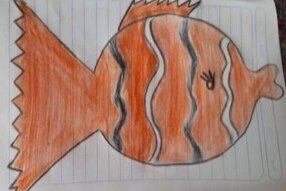Telling Tales Together....
… storytelling with Little ‘Uns
A blog from Hands Up Project volunteer and storyteller, Cassandra Wye, full of brilliant ideas for storytelling with young learners. Thanks, Cassandra!
Why Tell Stories?
Stories introduce young audiences to the sounds of the English language. They may not fully understand the story but they can enjoy the experience of hearing a language spoken.
How can we make the sound of English exciting?
We can use our voices to help the teaching and learning of “phonics” - the sounds of English language
You can:
Elongate the sound of a word.
Enunciate every syllable
Exaggerate the sounds in every word.
Try making the sound of rain - plip, plop.
How can you exaggerate that sound?
So that the children can hear both the “pl” and the “op”?
We can use sound effects - to help the children understand a new word.
For example “Splish splash” - to emphasise the sound of the verb “swim”
We can use rhythm. Make patterns of sounds and words that are repeated over and over so the children can recognise and join in with them.
We can use the MINIMUM of words to MAXIMUM effect.
Make a story short and simple.
Then, it is easy to say and easy to remember - for both you and your children
But - we don’t have to use words at all
Storytelling communicates meaning with the minimum of shared language knowledge. I can work with audiences of 1000’s - 90% of whom do not speak English
How can I communicate a story without words?
Body language!
We can use the whole of our body to communicate meaning.
This is essential for young or new learners.
If you show them the meaning of a word - it is much easier for them to understand.
SHOW how to swim with your arms
SHOW how to jump with your hands
SHOW how the rain falls with your finger-tips.
Find a movement that shows the meaning of every word.
Repeat the movement every time you say that word.
Better still, as the children get more confident, ask them to suggest a movement.
Research has shown that combining a movement with a sound or word, improves a child’s ability to remember.
Asking them to suggest a movement for a new word - passes the ownership of the story onto them, putting them in control of the development of the tale
Working across modes of communicate reinforces learning
Small children learn through their bodies - so harness the power of movement to help develop their vocal and verbal skills.
This is especially important for children with delayed language development
Repetition, repetition, repetition
I use a LOT of repetition - of sounds, words and movement.
This gives young children the cues they need to recognise a new word, understand its meaning and to join in.
Another way children can participate…
Active participation rather than passive listening
Encouraging children to join in - helps them to gain the confidence to speak aloud in English, WITHOUT pressure
First they follow you.
Then they start to anticipate and say it before you do.
Then they take over - and begin to tell the story without you.
Grow Your Own Stories
You can guide children through the process of listening, joining in, taking over and creating their own version of a story heard- step by step over the course of your lessons
It is a really effective way of helping children develop their story-making skills- without having to write.
There are so many ways very young children can be actively involved in language learning through storytelling.
Even beginners can come up with an idea for a new character, a new movement, a new sound effect.
Even a shy child can say or show “Yes” or “No”
Even a toddler can join in with the actions
Why not give it a go - it is easier than you think!
https://www.facebook.com/handsupproject
Cassandra Wye is live on Facebook with Hands Up Project every Friday at 10am Palestine time . Come and join her demonstrating these techniques every week!



